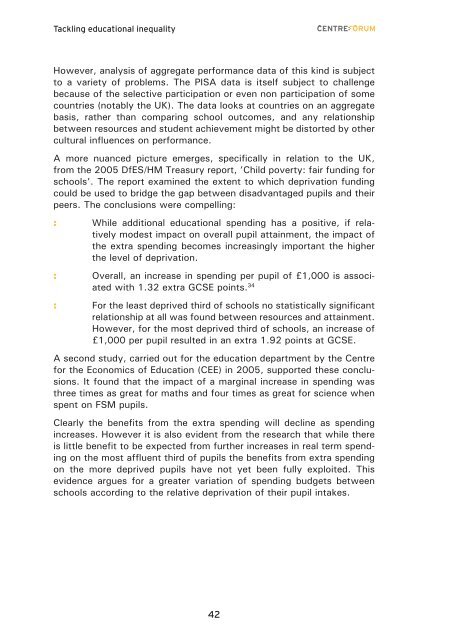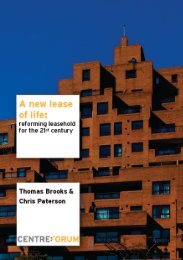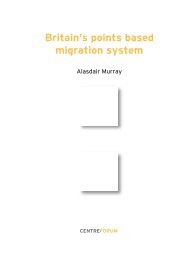Tackling educational inequality - CentreForum
Tackling educational inequality - CentreForum
Tackling educational inequality - CentreForum
Create successful ePaper yourself
Turn your PDF publications into a flip-book with our unique Google optimized e-Paper software.
<strong>Tackling</strong> <strong>educational</strong> <strong>inequality</strong><br />
However, analysis of aggregate performance data of this kind is subject<br />
to a variety of problems. The PISA data is itself subject to challenge<br />
because of the selective participation or even non participation of some<br />
countries (notably the UK). The data looks at countries on an aggregate<br />
basis, rather than comparing school outcomes, and any relationship<br />
between resources and student achievement might be distorted by other<br />
cultural influences on performance.<br />
A more nuanced picture emerges, specifically in relation to the UK,<br />
from the 2005 DfES/HM Treasury report, ’Child poverty: fair funding for<br />
schools’. The report examined the extent to which deprivation funding<br />
could be used to bridge the gap between disadvantaged pupils and their<br />
peers. The conclusions were compelling:<br />
: While additional <strong>educational</strong> spending has a positive, if relatively<br />
modest impact on overall pupil attainment, the impact of<br />
the extra spending becomes increasingly important the higher<br />
the level of deprivation.<br />
: Overall, an increase in spending per pupil of £1,000 is associated<br />
with 1.32 extra GCSE points. 34<br />
: For the least deprived third of schools no statistically significant<br />
relationship at all was found between resources and attainment.<br />
However, for the most deprived third of schools, an increase of<br />
£1,000 per pupil resulted in an extra 1.92 points at GCSE.<br />
A second study, carried out for the education department by the Centre<br />
for the Economics of Education (CEE) in 2005, supported these conclusions.<br />
It found that the impact of a marginal increase in spending was<br />
three times as great for maths and four times as great for science when<br />
spent on FSM pupils.<br />
Clearly the benefits from the extra spending will decline as spending<br />
increases. However it is also evident from the research that while there<br />
is little benefit to be expected from further increases in real term spending<br />
on the most affluent third of pupils the benefits from extra spending<br />
on the more deprived pupils have not yet been fully exploited. This<br />
evidence argues for a greater variation of spending budgets between<br />
schools according to the relative deprivation of their pupil intakes.<br />
42





